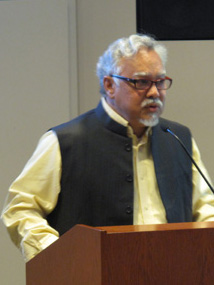
Harvard-Yenching Institute Annual Roundtable
May 7, 2012
Links to video:
Panel One:
- Professor Prasenjit Duara (National University of Singapore) — Part 1
- Professor Prasenjit Duara (National University of Singapore) — Part 2
- Professor Yasheng Huang (Massachusetts Institute of Technology) — Part 1
- Professor Yasheng Huang (Massachusetts Institute of Technology) — Part 2
- Professor Tarun Khanna (Harvard Business School/South Asia Initiative)
- Discussion and Q&A — Part 1 | Part 2 | Part 3 | Part 4 | Part 5
Panel Two:
- Professor Prerna Singh (Harvard University) — Part 1
- Professor Prerna Singh (Harvard University) — Part 2
- Professor Lily Tsai (Massachusetts Institute of Technology) — Part 1
- Professor Lily Tsai (Massachusetts Institute of Technology) — Part 2
- Professor Devesh Kapur (University of Pennsylvania) — Part 1
- Professor Devesh Kapur (University of Pennsylvania) — Part 2
- Professor Mark Frazier (Oklahoma University)
- Discussion and Q&A — Part 1 | Part 2 | Part 3 | Part 4
Panelists:
- Prasenjit Duara (National University of Singapore)
- Mark Frazier (Oklahoma University)
- Yasheng Huang (MIT)
- Devesh Kapur (University of Pennsylvania)
- Tarun Khanna (Harvard University)
- Prerna Singh (Harvard University)
- Lily Tsai (MIT)
Moderator: Elizabeth Perry (Harvard University/HYI)
This roundtable brought together a group of distinguished scholars of China and India to consider some of the major political problems and perils facing the Asian giants today. How do the world’s two biggest countries compare in terms of their ability to manage and mollify their often unruly citizens? How well does each of them cope on the ground with such enormous challenges as poverty and inequality, popular protest, ethnic conflict, and environmental degradation? How effectively do central and local governments coordinate, complement, or contradict one another in meeting these challenges? Can China and India’s relative successes and shortcomings shed light on prospects for democratic versus non-democratic governance in the twenty-first century?
This event was co-sponsored with the Asia Center, the Fairbank Center for Chinese Studies, and the South Asia Initiative
